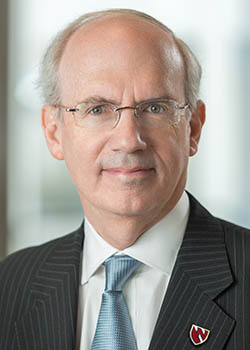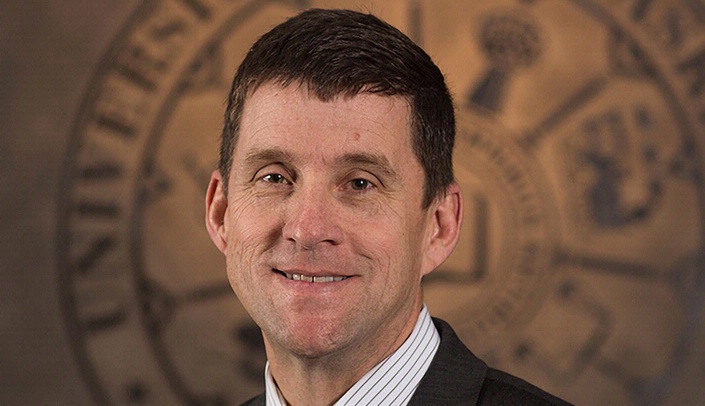A message from Dr. Gold
Dear UNMC Staff, Faculty and Students,
 |
Jeffrey P. Gold, M.D. |
As we navigate these challenges together, let me be clear that protecting our academic enterprise is our top priority. Our mission of education, research, clinical care and outreach cannot slow. We must continue our vital work that benefits our community, our state, the nation and the world.
I am committed to keeping an open line of communication during this process. We are currently planning opportunities for questions and feedback. Additionally, please know that you can reach out to me at any time by emailing .
Yours truly,
Jeffrey P. Gold, M.D.
University leaders announce changes
By Melissa Lee, University of Nebraska
University of Nebraska President Hank Bounds, Ph.D., was joined Wednesday by the NU chancellors in announcing broad changes in structure, policy and process that the university will implement to help manage a recurring $49 million budget shortfall.
The changes are necessitated by cuts in state funding during the last legislative session combined with the university’s rising costs.
“Budget cuts are never easy. They are even more painful when they come at the precise time that the University of Nebraska is experiencing remarkable momentum in growing our state’s economy and quality of life,” Dr. Bounds said. “Virtually every employee will be impacted in some way by the changes that we will make.
“These changes are the result of diligent, thoughtful work by colleagues who have chosen to view this challenge also as an opportunity — to find creative ways to do more with less so we can continue to serve the state effectively. We have difficult work ahead, but we’re focused on the future and what kind of university we want to be.”
Jeffrey P. Gold, M.D., chancellor of UNMC and the University of Nebraska at Omaha, said the university would continue to fulfill its mission to the state.
“As Dr. Bounds notes, these challenges also provide opportunity,” Dr. Gold said. “UNMC and UNO are more committed than ever to their mission of education, research and service, and we are poised to continue to have a positive impact on our community, our state, the nation and the world.”
Changes include consolidation, integration
Changes, recommended by teams of subject-matter experts from across and outside the university, include consolidation of NU’s facilities, energy, procurement and human resources functions, areas that previously have been based on each campus with no formal university-wide structure.
NU also will continue to integrate its information technology services, a process that began more than a year ago in order to build a less costly, more unified IT system to serve all campuses.
Policy changes include a reduced mileage reimbursement rate for employees, a new software system for submitting travel expense reports that will save staff time and paper usage, and plans to significantly reduce printing and copying costs over time.
More cuts will be announced soon as recommendations of the university’s “Budget Response Team,” convened in January, undergo continued vetting. In all, NU expects its budget-reduction efforts to yield $30 million in long-term savings, including the loss of at least 100 positions, through attrition where possible, reductions where not.
Together, the long-term savings in facilities/energy ($7 million), procurement ($6.8 million), human resources ($4 million) and IT ($6 million) will make up about 80 percent of the $30 million total. Savings will come from efficiencies from sharing more services and resources across the campuses, reductions in operational costs and position reductions.
The remainder of the reductions to operational costs will come from reductions and efficiencies in other areas including printing and copying, travel, financial operations, and public relations and marketing.
Rethinking how NU does business
The scale by which NU must permanently reduce its spending means the university must re-think the way it does business in order to best protect its highest priorities of affordability and academic quality, Dr. Bounds said. He noted the university will violate both of those principles in closing its budget gap — and that additional cuts in state funding would have an even more significant impact on tuition and academic programs.
The work of the Budget Response Team was made more challenging by trends in state funding that have required the university to become leaner over time. For example, NU has the same number of employees funded by tax and tuition dollars today as it did in 2000, even though enrollment and research have grown significantly during that time.
Budget Response Team recommendations were submitted to a university-wide steering committee, chaired by Executive Vice President and Provost Susan Fritz, Ph.D., and Chief NU Strategist James Linder, M.D., which then submitted final recommendations to the chancellors and president for approval.
Implementation of the team’s work is being led by Marjorie Kostelnik, past dean of the University of Nebraska-Lincoln’s College of Education and Human Sciences.
Teams in research services, institutional research, parking and campus safety have convened to begin looking for opportunities to develop best practices to integrate services across campuses, which could create additional savings. A digital education team will continue its work in
building a strategy for greater revenue growth for NU’s online programs.
Furthermore, Dr. Bounds said the university has an opportunity to capture savings as part of Gov. Pete Ricketts’ call for less red tape in state government. Dr. Bounds has directed the chancellors and business, academic, IT and legal leadership teams to bring him ideas to send to the governor on state regulations that are unnecessarily costly or burdensome for the university.
